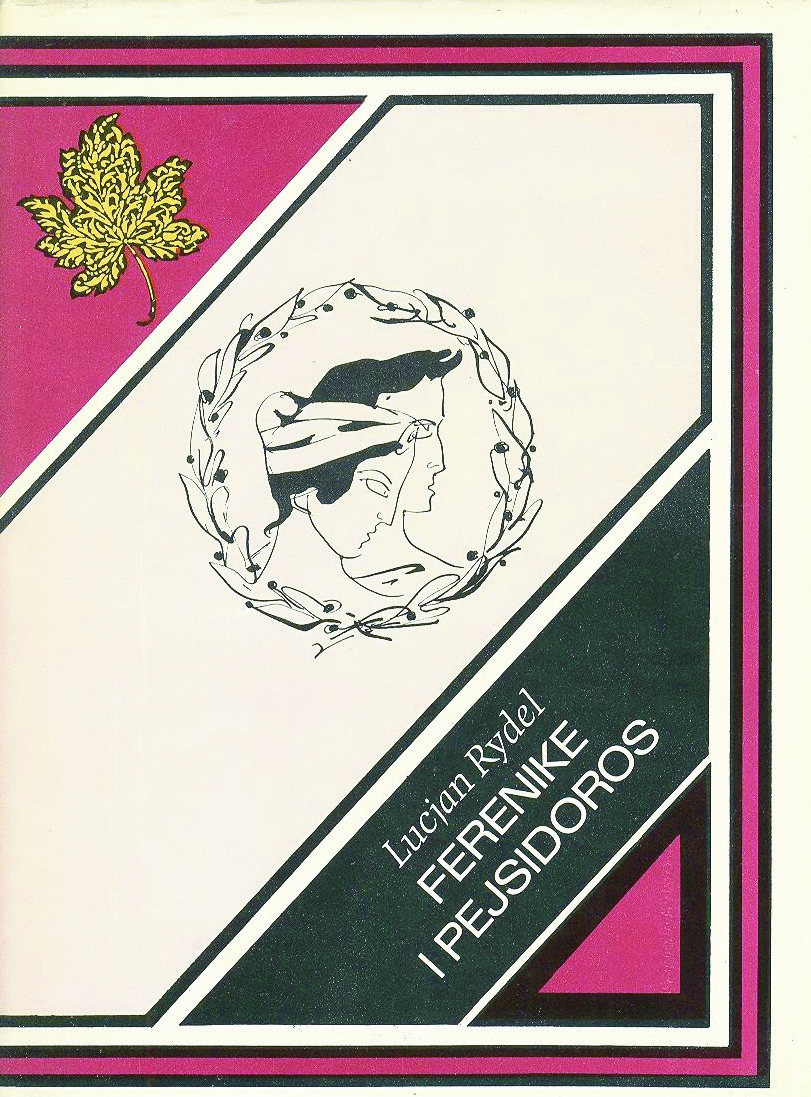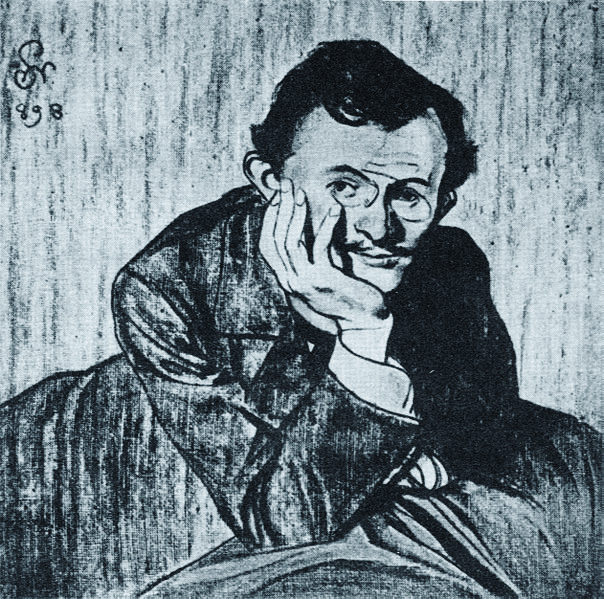Title of the work
Country of the First Edition
Country/countries of popularity
Original Language
First Edition Date
First Edition Details
Lucjan Rydel, Ferenike i Pejsidoros. Kraków: G. Gebethner, 1909, 132 pp.
Available Onllne
Text of the editio princeps at Jagiellońska Biblioteka Cyfrowa (accessed: October 5, 2020).
Genre
Novellas
Target Audience
Crossover (Children, teenagers, young adults)
Cover

Edition: Warsaw: Nasza Księgarnia, 1970, 108 pp. (Leon Urbański, Jerzy Treuler ill). Courtesy of Nasza Księgarnia.
Author of the Entry:
Summary: Paweł Siechowicz, University of Warsaw, pawelsiechowicz@wp.pl
Analysis: Marta Pszczolińska, University of Warsaw, m.pszczolinska@al.uw.edu.pl
Peer-reviewer of the Entry:
Katarzyna Marciniak, University of Warsaw, kamar@al.uw.edu.pl
Elżbieta Olechowska, University of Warsaw, elzbieta.olechowska@gmail.com

Portrait of the Author by Stanisław Wyspiański (1869–1907), retrieved from Wikimedia Commons.
Lucjan Rydel
, 1870 - 1918
(Author)
Famous poet, playwright and translator, brilliant man of letters and community activist, one of the main figures of the literary movement Young Poland. Published two volumes of poetry, which reveal his admiration for Ancient Greece; several dramas (e.g. Betlejem Polskie [Polish Bethlehem: a nativity play in verse], 1904); and some outstanding translations (e.g. fragments of Homer’s Iliad). His wedding with a farmer’s daughter Jadwiga Mikołajczykówna was the inspiration for Stanisław Wyspiański’s play Wesele [The Wedding], 1901, one of the Polish stage masterpieces. Rydel’s gripping lectures on the culture of Ancient Greece given at the Academy of Fine Arts in Cracow and at the Jagiellonian University widely contributed to the revival of interest in Antiquity, which along with the fascination with folklore were the main characteristics of the cultural atmosphere of the Young Poland movement.
Sources:
Józef Dużyk, Droga do Bronowic. Opowieść o Lucjanie Rydlu, Warszawa: Ludowa Spółdzielnia Wydawnicza, 1972.
en.wikipedia.org (accessed: October 5, 2020).
publio.pl (accessed: October 5, 2020).
Bio prepared by Paweł Siechowicz, University of Warsaw, pawelsiechowicz@wp.pl
Summary
Based on: Katarzyna Marciniak, Elżbieta Olechowska, Joanna Kłos, Michał Kucharski (eds.), Polish Literature for Children & Young Adults Inspired by Classical Antiquity: A Catalogue, Faculty of “Artes Liberales”, Warsaw: University of Warsaw, 2013, 444 pp.
An anecdote reported by Pausanias in his Description of Greece (5.6.7–8; 6.7.2) is retold by Rydel. Pherenice is the mother of a young athlete Peisidoros, who prepares himself to attend the Olympic Games (Rydel dates them at 428 B.C., although it is more probable that those Olympics took place in 404 B.C.). Pherenice’s father and both of her brothers were Olympic winners, but she, being a woman, was unable to witness their triumphs. She decides to disguise herself as a man and watch her son compete in the Olympics, although if discovered, she faces death penalty. The outburst of joy and love at the sight of her son’s victory reveals that she is a woman. Fortunately, the glory of her son’s achievement and the memory of the past triumphs of her father and brothers save her. She is allowed to share the joy and glory with her son. The story gives Rydel an opportunity to describe the atmosphere of the Olympics — a peaceful gathering of Greeks, including philosophers (Socrates), historians (Herodotus and Thucydides), and dramatists (Sophocles and Euripides), coming from every polis. He also provides detailed descriptions of sculptures and architecture found in Olympia at that time.
Analysis
Lucjan Rydel prepared a detailed and elaborate text for young readers. Drawing on Pausanias’ anecdote, he created an entire narrative in which the original becomes a perfect pretext to show the ancient world of Greek diversity, to which contribute examples from various walks of life. What is happening to the main characters could be reduced to just one sentence, while digressions in the form of extensive descriptions of Greek reality in 5th B.C. based on the knowledge available to the author, form the core of the novella. These descriptions refer to places, including buildings and municipal/communal structures (Alpheiós Valley, temple district, bouleuterion, stadium), people (including region, social or professional status), clothing, ceramic and metal vessels, means of transport, customs, and, of course, the Games as such.
Rydel based his novella not only on Pausanias' Description of Greece, but also on other ancient sources, the works of Thucydides, Plutarch, Lucian, Plato, Xenophon, Strabo, Euripides, Sophocles, and Aristophanes, resulting in his descriptions of places, people and their statements, customs, pieces of art, products of material culture or the course of historical events, being as accurate and genuine as possible. In addition, he also used some German- and French-language scholarly studies available in his time. Due to this approach, the text not only provides a large amount of information, supported by numerous illustrations (engravings) but also paints a credible background against which the main characters are set.
All the sources and studies the author used are quoted in the endnotes in translation or the original language (e.g., see below, source here, accessed: October 5, 2020).

Quotations from ancient poetry and epics (Homer, Alcman, Tyrtaeus) also appear as part of the main text, e.g., in front of a group sculpture of Achaean warriors from Troy drawing lots to decide who is to take part in the duel with Hector, Alcibiades recites an extensive fragment of the Iliad illustrating this incident. Some of the quoted translations perfectly follow the rhythm of the original hexameter.
Placing the action in a specific location and time – Olympia during the Games – provides an excuse to place characters there from different parts of Hellas, who otherwise could not have been assembled in one place. Among the characters shown by Rydel, apart from the athletes taking part in the Olympics, there are people important for the world’s culture, politics, and ideas. The author presents Socrates and Alcibiades talking about wisdom and also introduces Euripides – an abrasive malcontent. The old Herodotus reads to the gathered people (and to Polish children listeners or readers) about the battle of Thermopylae. Then Thucydides wants to be like Herodotus and thinks about describing the ongoing Peloponnesian war. Socrates advises him that, since history is the result of human intentions, desires, and passions, he should first get to know human souls by knowing himself (γνῶθι σεαυτόν – know thyself). In addition to them, the old Sophocles and the admirer of his tragedies, Aristophanes, also appear as spectators in the stadium stands. The statements and dialogues of all the characters are based on source material. Among the characters, there are also mythological ones, such as Heracles or Pelops, treated by Greeks as historical figures who had an impact on the place of action (e.g., Heracles founded the altar of Zeus and planted a tree used from then on as the only one for sacrifices). The figures of gods and heroes are also shown through numerous works of art present in Olympia.
Most details relate to the Games – the competition itself, its structure and organization, starting from processions, sacrifices and the oath of fair play without deception, fraud, and bribery. The following disciplines are listed and described, with their original Greek names in parentheses: stade – straight-line sprint (δρόμος), diaulos – two-stade race (δίαυλος), dolichos – long race (δόλιχος), boxing (πυγμή), wrestling (πάλη), pankration (παγκράτιον), pentathlon – running, long jump, discus throw, javelin throw, wrestling (πένταθλον), and hoplitodromos – Hoplite race (ὁπλιτοδρόμος). The course of each discipline is also described, including the techniques used in throwing, jumping and wrestling. Alcibiades takes part and wins in the horse race, inviting everyone to a feast with generosity bordering on recklessness and carelessness.
The social position of women is also sketched through the adventures of the main character. The only woman mentioned except Pherenice is the priestess of Demeter, who is the only woman allowed to enter the area of the Olympic Games.
Further Reading
Dużyk, Józef, Droga do Bronowic. Opowieść o Lucjanie Rydlu, Warszawa: Ludowa Spółdzielnia Wydawnicza, 1972.
Grzymała-Siedlecki, Adam, "Państwo młodzi", in Niepospolici ludzie w dniu swoim powszednim, Kraków: Wydawnictwo Literackie, 1962, 211–225.
Kamieńska, Anna, "Posłowie" [Afterword], in Lucjan Rydel, Ferenike i Pejsidoros. Opowieść kulturalno-obyczajowa na tle igrzysk olimpijskich, Warszawa: Nasza Księgarnia, 1970, 91–99.
Krzyżanowski, Julian, Neoromantyzm polski, 1890–1918, Wrocław: Zakład Narodowy im. Ossolińskich, 1971, 72–74, 424–425.
Lucjan Rydel, en.wikipedia.org (accessed: October 5, 2020).
Lucjan Rydel, publio.pl (accessed: October 5, 2020).
"Pherenice", in Mark Golden, Sports in Ancient World from A to Z, London– New York: Routledge, 2004, 132.
Pigoń, Stanisław, "Ponad zgiełkiem weselnym", in Drzewiej i wczoraj: wśród zagadnień kultury i literatury, Kraków: Wydawnictwo Literackie, 1966, 329– 338.


